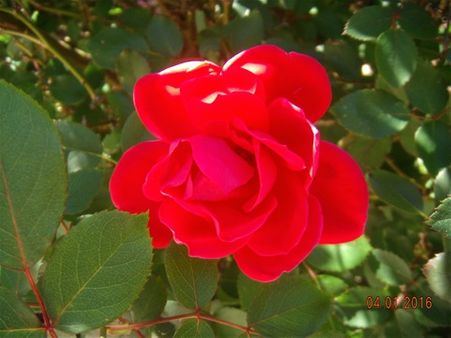"Charm and grace are deceptive, and beauty is vain [because it is not lasting], but a woman who reverently and worshipfully fears the Lord, she shall be praised!" Proverbs 31:30
Let's look at this verse in three parts. The first phrase is, "Charm and grace are deceptive..." Our society holds charm and grace as very appealing qualities, worthy of cultivating and beneficial to possess. As with most matters of "learned" behavior, however, they are designed to present a person in a "package." Sometimes the package accurately reflects the person inside, but many times it is cultivated simply to give a certain impression to others -- possibly to reflect a particular socio-economic group -- and hides the real inner person. In its purest form, it deceives others. In a worldly sense, certain manners, modes of living, and ways of dealing with others can be learned and perfected until they become second nature, thus leading others to believe there really is "good soil" beneath a carefully constructed veneer. On the other hand, a woman who cultivates her mind and spirit to godly fullness and maturity, as the Proverbs 31 woman has done, will possess true qualities of grace in a much deeper way as to make "charm" unnecessary. As a natural result of her reverence and devotion to God and His ways, the Proverbs 31 woman possesses a quality that attracts others to her without the deception of purposely cultivated charm. She has a graciousness about her that is a true reflection of godly qualities that, rather than being acquired from the outside in, emanate naturally from the inside out.
The second phrase in this verse is, "beauty is vain [because it is not lasting]..." Something vain is defined as "having no real value or importance; unsubstantial; empty; having a foolish craving for the admiration or applause of others." 1 (see Notes) The writer's prophecy in this verse is referring to a superficial beauty which, apart from any other qualities, is fruitless -- not producing anything of real value in one's life or in the lives of those with whom she has contact. Such can be said of anything beautiful which has no foundation, for when the wind blows it will not stand (as "a house built upon sand," in Matthew 7:26). 1 Peter 3:4,5 discusses wives being concerned not with merely external adornment, but with inward adorning -- Peter tells us that a gentle and peaceful spirit has incorruptible and unfading charm and, more importantly, is very precious in God's eyes. We can safely assume that the Proverbs 31 woman is visually becoming, for her beauty comes from within. Not only does she have that peaceful and reverent spirit whichs shows in her face and demeanor, but we know from the account in Genesis 12 of Sarah, Abraham's wife, that the reverential and worshipful fear of the Lord, with righteous living, makes a woman beautiful. We also know from prior verses that the Proverbs 31 woman tends to her own and her family's well-being, which shows in her physical appearance. This is an example of sophia wisdom in operation in her life.
The third and last phrase of this verse is, "but a woman who reverently and worshipfully fears the Lord, she shall be praised!" Proverbs 1:7 teaches that the reverential and worshipful fear of the Lord is the beginning, the choice part, the essence of knowledge. Psalm 111:10 teaches that it is also the beginning, or the prerequisite, of wisdom and skill. Here again, most importantly, is the Proverbs 31 woman's firm foundation: her reverential fear of the Lord. This is the nucleus of all she is and all she does; it is why she is a model woman in every way. It is the reason why each and every area of her life goes well and prospers, and because of which she shall be praised. Praised by whom? By her family, her friends, her associates; everyone with whom she interacts. Dake's footnote on this verse tells us she is "honored by the public." 2 (see Notes) The Proverbs 31 woman leads her life such that there is no room anywhere for others to speak ill of her, much like Paul admonishes wives, specifically, in Titus 2:5, and all Christians -- both men and women -- throughout his epistles.
